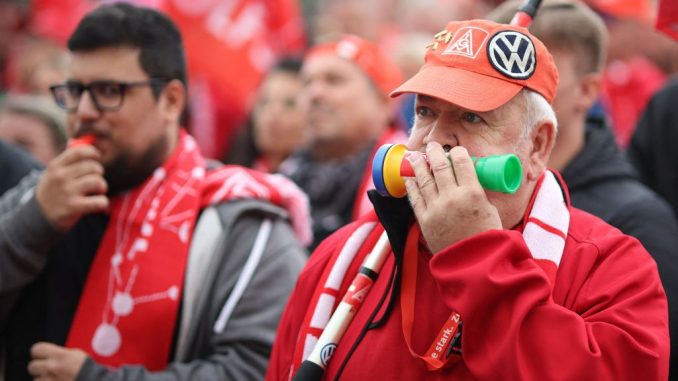
Volkswagen rejects German union wage demands
The collective labor agreement negotiations between Volkswagen and the German union IG Metall are in a stalemate. The IG Metall union is demanding a 7 percent wage increase, and Volkswagen has rejected that demand.
The negotiations are taking place at a time when the car company is in crisis: the company wants to save costs by cutting jobs and is considering closing factories.
The new collective labor agreement would apply to approximately 120,000 employees. About three thousand employees protested in Hannover for higher wages and against their company’s austerity plans. The union says it is surprised that VW immediately dug in its heels at the start of the negotiations.
But VW negotiator Arne Meiswinkel points out the emergency situation that VW is in. “Cost savings, greater efficiency and better productivity are the only way we can invest in new technologies and products,” he says.
Job guarantee
Volkswagen – which also includes the Audi, Skoda and Seat brands – employs almost 300,000 people in Germany. The company has a tradition of a long job guarantee. This currently protects employees against dismissal until 2029.
The company previously announced that it wanted to get rid of that agreement. This has to do with the fact that fewer workers are needed to make electric cars, explains Rico Luman, transport and automotive sector economist at ING. “The energy transition requires a structural adjustment, because an electric car consists of fewer parts than a fuel car.” He expects that in ten years fewer people will be needed to produce the same number of cars.
Manufacturer in dire straits
In addition, the company is having difficulty with tough competition in the electric car market, including from China. VW is struggling with declining sales figures. That is why the group wants to make cuts from July next year. If a Volkswagen factory were closed, it would be the first time.
The IG Metall union represents the majority of employees. The association hopes that follow-up agreements for the negotiations will be made by the end of November at the latest. If not, strikes may follow after December 1.

Be the first to comment